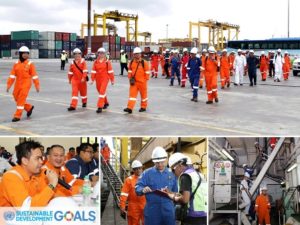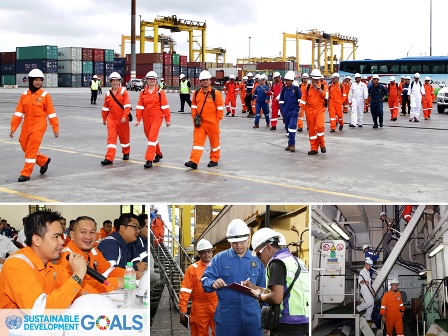 The International Maritime Organization (IMO) Assembly has adopted seven strategic directions to support the implementation of the United Nations Sustainable Development Goals and the 2030 Agenda for Sustainable Development.
The International Maritime Organization (IMO) Assembly has adopted seven strategic directions to support the implementation of the United Nations Sustainable Development Goals and the 2030 Agenda for Sustainable Development.
The Assembly met recently for its 30th session at the IMO headquarters in London, United Kingdom, the largest gathering at the headquarters, and adopted a revised mission statement, a vision statement (included for the first time), and the seven newly identified strategic directions.
The new directions include to improve implementation and enforcement of regulations; integrate new and advancing technologies in the regulatory framework, balancing the benefits against safety and security concerns, the impact on the environment and on international trade facilitation, the potential costs to the industry, and their impact on personnel; and respond to climate change by developing appropriate, ambitious and realistic solutions to minimize shipping’s contribution to air pollution.
The assembly also agreed to engage in ocean governance to regulate and control the use of the oceans and their resources; enhance global facilitation and security of international trade, addressing things like arrival and departure formalities, documentation and certification, and generally reducing the administrative burdens of ship operation; ensure regulatory effectiveness by improving the actual process of developing regulations; and ensure organizational effectiveness of the IMO, including that of its many stakeholders.
At the same time, the Assembly tackled various pressing issues and concerns.
It recognized the ongoing problem of marine plastic pollution and encouraged member states, parties to the International Convention for the Prevention of Pollution from Ships (MARPOL) Annex V, and international organizations to submit concrete proposals to the next sessions of the Marine Environment Protection Committee and the meeting of the parties to the London Convention and Protocol in 2018.
The Assembly also agreed to extend the IMO Ship Identification Number Scheme to more vessels, on a voluntary basis, to support ship safety and pollution prevention by being able to more easily identify vessels.
The number scheme applies to ships over 100 gross tonnage (GT) and is mandatory for passenger ships of 100 GT and upwards and all cargo ships of 300 GT and upwards. In 2013, the Assembly agreed to voluntary extension to fishing vessels over 100 GT.
Further voluntary application is now extended to fishing vessels of steel and non-steel hull construction; passenger ships of less than 100 GT, high-speed passenger craft and mobile drilling units, engaged on international voyages; and to all motorized inboard fishing vessels of less than 100 GT down to a size limit of 12 meters in length overall authorized to operate outside waters under national jurisdiction of the flag state.
Moreover, the Assembly adopted revised Procedures for Port State Control (PSC). Port state control plays a crucially important role as the second line of defense against sub-standard ships. The resolution contains a comprehensive compilation of guidelines relevant to port state control. It updates the previous Procedures for PSC adopted in 2011.
The revisions include, in particular, guidelines on the International Safety Management (ISM) Code; the certification of seafarers, hours of rest and manning; and procedures regarding voluntary early implementation of amendments to the 1974 International Convention for the Safety of Life at Sea (SOLAS) and related mandatory instruments.
IMO is the United Nations specialized agency with responsibility for the safety and security of shipping and the prevention of marine pollution by ships.
Photo courtesy of IMO





